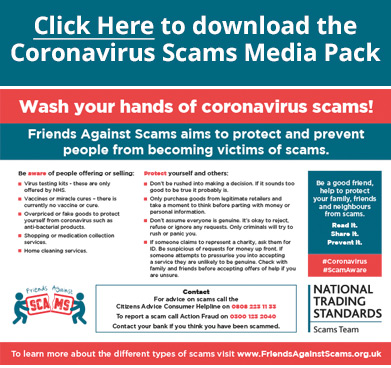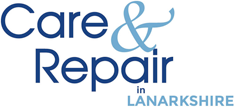Please read this in regard to the coronavirus and how you can access support and safeguard yourself against scams.
 We hope that you are well. As a reminder, we would like to re-iterate the government and NHS guidelines about maintaining good hygiene; only go outside for food, health reasons or essential work, and stay two metres away from other people outside of your household.
We hope that you are well. As a reminder, we would like to re-iterate the government and NHS guidelines about maintaining good hygiene; only go outside for food, health reasons or essential work, and stay two metres away from other people outside of your household.
It is particularly important for people who are over 70 and/or have an underlying health condition.
Things such as Facebook Community Groups, WhatsApp Groups and the Nextdoor social network that send neighborhood alerts can be great ways of staying in touch with those around you, however, it can be difficult to know who to trust. These are all online and not everyone has access to the internet, so please see the telephone numbers below for your County if you require assistance.
Please be aware that not everyone out there is trustworthy and some people will take advantage of this unusual situation our society is facing.
Here are just some of the scams we are aware of, but please note that criminals come in all shapes and sizes and can contact you at the door, by phone, post or online:
• Be aware of people offering miracle cures or vaccines for coronavirus – there is no specific treatment for coronavirus (COVID-19). Treatment aims to relieve the symptoms until you recover.
• Home cleaning services
• People impersonating healthcare workers, claiming to be offering ‘home-testing’ for coronavirus – this is a scam and these kits are not currently available to buy.
• Emails saying that you can get a refund on taxes, utilities or similar are usually bogus and they are just after your personal and bank details.
• There are lots of fake products available to buy online that say they can protect you or cure coronavirus. These will not help and are designed to take your money.
• There are new mobile phone applications that claim to give you updates on the virus but instead, they lock your phone and demand a ransom.
• Your bank or the police will never ask for your bank details over the phone.
• People offering to do your shopping or collecting medication and asking for money upfront and then disappearing.
Tips to avoid being scammed:
• Be cautious and listen to your instincts. Don’t be afraid to hang up, bin it, delete it or shut the door.
• Take your time; don’t be rushed.
• If someone claims to represent a charity, ask them for ID. Be suspicious of requests for money upfront. If someone attempts you into accepting a service they are unlikely to be genuine. Check with family and friends before accepting offers of help if you are unsure.
• If you are online, be aware of fake news and use trusted sources such as .gov.uk or NHS.uk websites. Make sure you type the addresses in and don’t click on links in emails.
• Only purchase goods from legitimate retailers and take a moment to think before parting with money or personal information.
• Know who you’re dealing with – if you need help, talk to someone you know or get in touch with your local Council on the numbers below.
• Protect your financial information, especially from people you don’t know. Never give your bank card or PIN to a stranger.
Contact information:
• If you think you’ve been scammed, report it to Action Fraud on 0300 123 2040 and if you need advice, call the Citizens Advice Consumer Helpline on 0808 223 1133. If you are in immediate danger, contact the police on 999.
• Contact your bank if you think you have been scammed.
To learn more about different types of scams and how to protect yourself and others, visit www.FriendsAgainstScams.org.uk and complete the free online training.
Why not become a Scam Marshal? A Scam Marshal is any resident in the UK who has been targeted by a scam and now wants to fight back and take a stand against scams. Scam Marshals do this by sharing their own experiences, helping others to report and recognise scams and sending any scam mail that they receive to the National Trading Standards Scams Team so that it can be utilised as evidence in future investigative and enforcement work. Visit www.FriendsAgainstScams.org.uk/ScamMarshals for more information and to sign up.
Read more on Covid-19 scams from National Trading Standards here.
And read more from Friends Against Scams here.
Read it. Share it. Prevent it.
#ScamAware #Coronavirus


